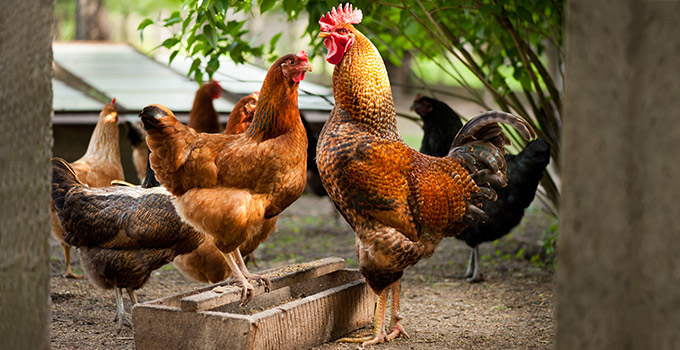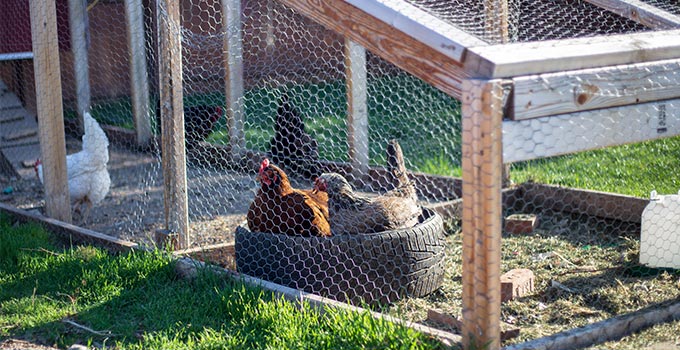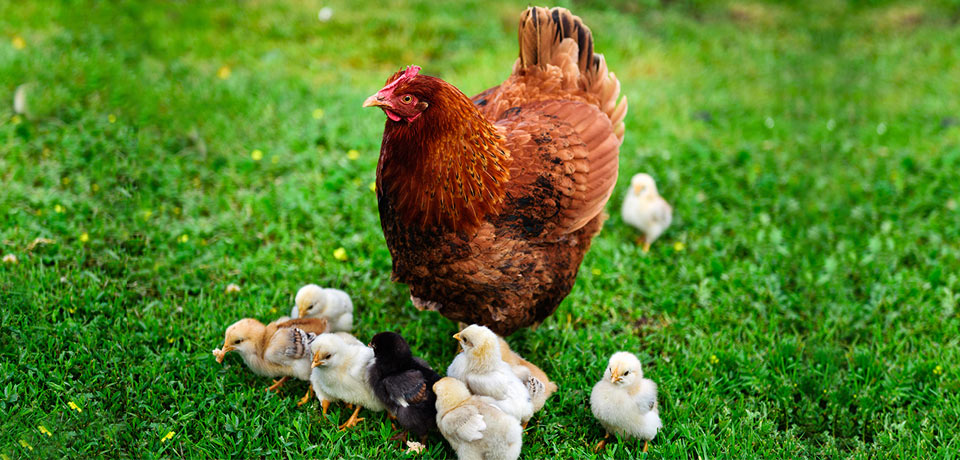Looking to liven up the yard a little bit? Chickens make a great addition to the farm, but did you know they can also do well in town? If you have the space, they’re a great addition to the farm or backyard when local bylaws allow for them. If you’re in town, choose hens – roosters can be a little noisy. You’ll get access to fresh eggs, they fertilize lawns and gardens, and they provide natural pest control thanks to their appetite for insects.
Before you bring your brood home, it’s essential to know how to keep your flock healthy and create a happy home for them. Below are some tips to get you started.

Healthy Chickens are Happy Chickens
Start by giving your new chickens constant access to fresh, clean water. Make sure their area is clean and dry to stop rodent problems and the spread of disease and mites. It’s also essential to sanitize any equipment, clothing and boots coming into contact with the chickens or their coop to avoid tracking in illnesses or pests. Last, maintain fresh airflow in their coop and roosting areas to allow ammonia to escape.
Understanding Your Flock
Chickens are happier if they are allowed to carry out their natural behaviours, so it's important to create the right environment. Laying hens, which are great for small flocks or first-time poultry caretakers, require nesting boxes for laying their eggs. Nesting boxes can be purchased, or you can always make your own from cardboard or plastic boxes with bedding inside. Older laying hens will typically produce one egg per day.
Chickens will also need a place to roost at night. Providing a roosting area for your flock is simple: it’s as easy as mounting a plank, pole or branch somewhere near the coop.
Dust bathing might be a little less familiar to those who’ve never raised chickens before. Your birds will want to roll around in available dust, essentially bathing themselves in it. In warmer months, a dust bath is as simple as giving them access to open soil. Come winter, consider purchasing Fresh Coop Dust Bath from your local Co-op. Pour it into a plastic child-sized pool or large bin, ensuring it’s deep enough for your birds.
Chickens are foragers by nature, and it’s important to allow them access to areas that will enable them to peck with their beaks or scratch with their claws at the soil, grass or coop bedding materials (straw, shavings, sand, peat or litter). They need the ability to move, stretch their wings, dust and sun bathe, perch on roosts and socialize with other chickens. For broody hens, the instinct to raise chicks is so strong that she will sit on the fertilized eggs for 21 days until her chicks hatch, rarely leaving her nest for food and water.

Housing a Hen
Providing a home for your chickens will look different depending on the season. Through most of spring, summer and fall, your chickens can stay outside most of the time. As temperatures plummet in the winter, however, it’s important to provide an insulated shelter that’s out of the wind. Coops can be built or purchased. Just make sure that your coop is practical, easy to clean and offers nesting boxes, roosts, a sliding door and an enclosed chicken run. In winter, make sure your henhouse is in an insulated area, such as a shed or garage with brooder lamps to keep these areas warm. Heated waterers are also helpful to keep water available for your flock.
Speak with your local Co-op Feed expert for more information on raising chickens and the right solutions for you.

